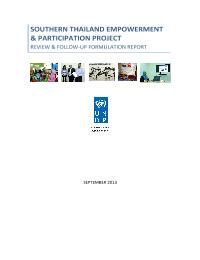
Southern Thailand Empowerment and Participation Project - Review and Follow-up Formulation Report
Completedon 8 Sep, 2013
Evaluation Plan
Planned End Date
Sep 2013
Evaluation Type
Project
Management Response
Yes
Evaluation Budget
$22,829
Evaluation Title
Southern Thailand Empowerment and Participation Project - Review and Follow-up Formulation Report
Atlas Project Number
00074646
Plan Period
Status
Completed
Type
Project
Plan Date
1 Sep, 2013
Completion Date
8 Sep, 2013
Budget
$22,829
Expenditure
$0
Source of Funding
TF & CSA
Management Response
Yes
Quality Assessment
No
Joint Programme
No
Joint Evaluation
No
GEF Evaluation
No
Stakeholders
Prince of Songkhla University
Countries
Thailand
Comments
Yes
Expand
Atlas Project Number
00074646
Plan Period
Status
Completed
Type
Project
Management Response
Yes
Plan Date
1 Sep, 2013
Quality Assessment
No
Completion Date
8 Sep, 2013
Joint Programme
No
Joint Evaluation
No
Budget
$22,829
GEF Evaluation
No
Expenditure
$0
Stakeholders
Prince of Songkhla University
Source of Funding
TF & CSA
Countries
Thailand
Comments
Yes
Expand
Output 2.4. Frameworks and dialogue processes engaged for effective and transparent engagement of civil society in national development
1: Others


